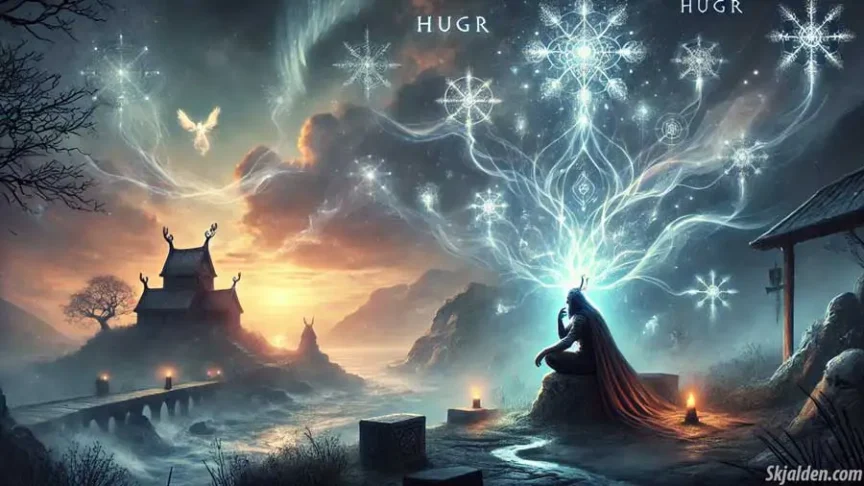In Norse mythology, the soul is not a single entity but a composite of several elements, each crucial to shaping a person’s life. One essential element is hugr, representing the mind or consciousness.
Hugr governs thoughts, will, and intellectual processes, significantly influencing behavior and decision-making. Understanding hugr illuminates its key role in the Norse concept of the soul and its impact on personal actions and moral choices.
The Role of Hugr and Symbolism of Huginn
The term hugr, from Old Norse, means thought or mind. It is a fundamental part of oneself, steering both deliberate actions and conscious decisions. This aspect deeply influences an individual’s purpose and intellect, reflecting their values and attitudes.
Odin’s raven Huginn, whose name derives from the same root as hugr, symbolizes this connection. Huginn, representing thought, flies out into the world daily, gathering information and returning to Odin to whisper all that he has seen and learned. This allegory enriches the understanding of hugr as not just an internal faculty but one that interacts with the world, bringing back knowledge to its possessor.
Enhancing Hugr
Strengthening hugr is achievable through various methods. Engaging with ancient sagas and rune inscriptions enriches knowledge. Experiences in leadership and combat sharpen cognitive abilities. Practices like meditation deepen understanding and emotional resilience.
Participating in rituals can foster spiritual connections, while creating and reciting poetry enhances memory and creativity. These activities collectively fortify hugr, equipping individuals to navigate life more effectively.
Insights from Norse Psychology
Hugr provides profound insights into Norse perceptions of human psychology. It showcases their deep understanding of the impact of mental functions on an individual’s life and destiny. Hugr emphasizes that thoughts and intentions are not just internal; they are powerful forces that shape character and determine fate.
This recognition of the power of hugr highlights the Norse’s advanced awareness of the interconnection between mental and spiritual health, with each person’s mind contributing significantly to their moral and existential pathways.
This sophisticated understanding reflects a culture that highly valued the role of the mind in personal and communal well-being. It was seen as essential to the fabric of societal norms and individual success. Appreciating hugr reveals that Norse culture was remarkably progressive in recognizing the importance of psychological integrity and its influence on broader life outcomes.
This view underscores their nuanced approach to human nature, where mental states are pivotal in navigating life’s challenges and fulfilling one’s destiny.
